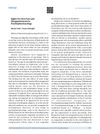
Alopecia areata, a type of hair loss, may be passed through T cells and has genetic links, while treatments vary in effectiveness. Male pattern baldness can be treated with finasteride and is influenced by androgens in hair follicles.
[object Object]  32 citations,
February 2024 in “Growth Hormone & IGF Research”
32 citations,
February 2024 in “Growth Hormone & IGF Research” Dihydrotestosterone (DHT) stops hair growth in mice by lowering a growth factor important for hair.
 August 2023 in “International journal of basic and clinical pharmacology”
August 2023 in “International journal of basic and clinical pharmacology” Herbal hair serum promotes natural hair growth and maintains healthy hair.
 6 citations,
April 2010 in “Journal of Dermatological Science”
6 citations,
April 2010 in “Journal of Dermatological Science” Laminin-511 may help promote hair growth, while laminin-332 does not affect hair loss.
 9 citations,
January 1966 in “Economic botany”
9 citations,
January 1966 in “Economic botany” Plant-based ingredients in hair care are being replaced by synthetic alternatives.
 9 citations,
November 2013 in “Presse Medicale”
9 citations,
November 2013 in “Presse Medicale” The document concludes that managing female hyperandrogenism requires a combination of identifying the cause, lifestyle changes, medication, and cosmetic treatments.
 2 citations,
January 1908 in “Journal of the American Medical Association”
2 citations,
January 1908 in “Journal of the American Medical Association” Fear of hair-related issues causes significant mental distress, especially in high-stress women.
 October 2023 in “International journal of research in Ayurveda and pharmacy”
October 2023 in “International journal of research in Ayurveda and pharmacy” Keedari thailam is effective for treating alopecia areata and has multiple health benefits.
 23 citations,
March 1988 in “Biochemical Pharmacology”
23 citations,
March 1988 in “Biochemical Pharmacology” Minoxidil stops cells from making prostacyclin, which may help with hair growth. More research is needed.
 1 citations,
January 2009 in “Cochrane Database of Systematic Reviews”
1 citations,
January 2009 in “Cochrane Database of Systematic Reviews” Review determines effective, safe treatments for female hair loss.
 24 citations,
January 2021 in “Dermatologic Therapy”
24 citations,
January 2021 in “Dermatologic Therapy” Platelet-rich plasma (PRP) is a safe and potentially effective way to treat hair loss, especially when combined with minoxidil.
 2 citations,
August 2019 in “Asian journal of pharmaceutical and clinical research”
2 citations,
August 2019 in “Asian journal of pharmaceutical and clinical research” Cinnamon bark extract may help prevent weight loss and hair loss in breast cancer patients during chemotherapy and is safe to use.
 5 citations,
October 2014 in “Methods”
5 citations,
October 2014 in “Methods” The document explains how to create detailed biological pathways using genomic data and tools, with examples of hair and breast development.
 December 2022 in “International journal of preventive, curative & community medicine”
December 2022 in “International journal of preventive, curative & community medicine” PCOS is a common hormonal disorder in women, causing symptoms like acne and irregular periods, and is managed with medication and lifestyle changes.
 January 2022 in “Skin appendage disorders”
January 2022 in “Skin appendage disorders” A woman with alopecia totalis regrew dark hair in bands after using a corticosteroid ointment.
October 2022 in “Our Dermatology Online” The Trust tonic is more effective than minoxidil for treating hair loss.
63 citations,
February 2017 in “ACS biomaterials science & engineering” Polydopamine is a safe, effective, and permanent hair dye that turns gray hair black in one hour.
 October 2023 in “Cognizance journal”
October 2023 in “Cognizance journal” The document suggests using natural remedies like bloodletting and honey for various health issues but lacks scientific evidence for their effectiveness.
 4 citations,
July 2008 in “British journal of dermatology/British journal of dermatology, Supplement”
4 citations,
July 2008 in “British journal of dermatology/British journal of dermatology, Supplement” Poor response to topical immunotherapy in alopecia areata patients is linked to impaired cell responses.
40 citations,
June 2021 in “Clinical, cosmetic and investigational dermatology” JAK inhibitors show promise in effectively treating hair loss from alopecia areata.
 15 citations,
January 1998 in “Journal of Clinical Periodontology”
15 citations,
January 1998 in “Journal of Clinical Periodontology” Finasteride helps treat hair loss by blocking enzyme activity.
31 citations,
November 2015 in “PloS one” Reducing Tyrosinase prevents mature color pigment cells from forming in mouse hair.
 37 citations,
October 2006 in “Steroids”
37 citations,
October 2006 in “Steroids” New sulfur-containing steroid analogs show promise for more targeted medical treatments.
 9 citations,
March 2019 in “European Journal of Sport Science”
9 citations,
March 2019 in “European Journal of Sport Science” New signs like changes in blood markers, physical symptoms, and behavioral shifts may help detect hidden steroid use in athletes.
 24 citations,
December 2013 in “Sexual medicine reviews”
24 citations,
December 2013 in “Sexual medicine reviews” Finasteride can cause sexual problems and depression in young men.
 3 citations,
September 1980 in “Experientia”
3 citations,
September 1980 in “Experientia” Dobutamine does not mimic dopamine at therapeutic doses but may at very high concentrations; microfilaments, not microtubules, are important for wound healing in Xenopus embryos.
[object Object]  1 citations,
April 2009 in “Cochrane Database of Systematic Reviews”
1 citations,
April 2009 in “Cochrane Database of Systematic Reviews” Review finds no permanent solution for female hair loss.
 3 citations,
June 2014 in “Klinik Psikofarmakoloji Bulteni-bulletin of Clinical Psychopharmacology”
3 citations,
June 2014 in “Klinik Psikofarmakoloji Bulteni-bulletin of Clinical Psychopharmacology” The document concludes that there is hope for future psychopharmacology research despite challenges in treating schizophrenia.
5 citations,
January 2019 in “Revista Latino-americana De Enfermagem” Making platelet-rich plasma gel is cheap, safe, and easy when done by trained professionals.
20 citations,
January 2019 in “Toxicology Reports” Dunaliella salina microalgae is safe to eat and may boost health.























